The Turkish Republic of Northern Cyprus (TRNC, Turkish Kuzey Kıbrıs Türk Cumhuriyeti) is a republic on the northern and eastern side of the island of Cyprus, an island in the Mediterranean Sea, south of Turkey. It is only recognised by Turkey.
As the two regions are nearly completely separate from a traveller's point of view, this article will concentrate on the northern territory governed by the Turkish Republic of Northern Cyprus. This is not a political endorsement of claims by either side in the dispute. For travel information regarding the remainder of Cyprus, visit the Cyprus article.
Regions
Cyprus is divided into six administrative regions, each named for its administrative capital. The southern districts of Larnaca, Limassol and Paphos, the southern portion of Nicosia district, and a small part of Famagusta district are administered by the Republic of Cyprus. Since 1974, the Turkish Republic of Northern Cyprus has administered the following districts:
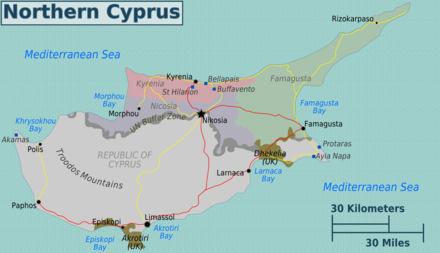
Nicosia district (including a small portion of Larnaca district)
Cities
Note that Cypriot cities have a variety of historical spellings and writings, all in fairly common use, and which change according to the context, whether it be Greek Cypriot, Turkish Cypriot or English. The following list emphasizes traditional English spellings, that will most often be encountered by the traveller.
- Nicosia (Lefkoşa / Lefkosia) - the divided capital, with the untouched beautiful historical buildings in the walled city and an increasingly vibrant city centre outside the walls
- Kyrenia (Girne / Keryneia) - a beautiful Mediterranean city with a historical harbour, a castle overseeing it, and under the beautiful Beşparmak/Pentadaktylos mountains, swarming with good seaside hotels, beaches and clubs
- Famagusta (Mağusa / Ammochostos) - home to a beautiful walled town, a ghost quarter under military control, good beaches and a vibrant nightlife
- Morphou (Güzelyurt / Omorfo) - the gateway to the greenest area of Northern Cyprus, surrounded by citrus trees, home to a historical church and a nostalgic town centre
- Lefke (Lefka) - green and mountainous, home beautiful date trees and seaview, and a historical mosque, gateway to Dillirga, the remote and beautiful part of Northern Cyprus
- İskele (Trikomo) - small and similar to any major Cypriot village, gateway to the Karpaz Peninsula, beautiful beaches and home to good traditional restaurants.
Other destinations
- Bellapais — a hillside village with gorgeous views of the sea and the ruins of a Gothic monastery
- St. Hilarion Castle — the most famous of the three castles of Northern Cyprus
Understand
Cyprus gained its independence from the United Kingdom in 1960. Despite a constitution which guaranteed a degree of power-sharing between the Greek Cypriot majority and the Turkish Cypriot minority, the two populations – with backing from the governments of Greece and Turkey, respectively – clashed violently in 1974, with the end result being the occupation of the northern and eastern 36.7% of the island by Turkey. In 1983, the Turkish-held area declared itself the "Turkish Republic of Northern Cyprus". So far, only Turkey recognizes the TRNC, while all other governments and the United Nations recognize only the government of the Republic of Cyprus over the whole island (excluding the British military bases). The UN operates a peacekeeping force and a narrow buffer zone between the two ethnic groups.
Climate
Subtropical Mediterranean climate with hot, dry summers and cool, wet winters.
Terrain
Central plain with the Beşparmak/Pentadaktylos mountains to the north.
Talk
The official language in Northern Cyprus is Turkish although a distinct Turkish Cypriot dialect is used in conversation. English is also widely used, especially in the resort town of Kyrenia. However, the entire island is somewhat of a cultural melting pot and in villages off the beaten track, some elderly locals who lived among Greek Cypriots before 1974 still use the Greek Cypriot dialect as their first language, even though they are Turkish Cypriots. Cypriot Greek is also natively spoken by a very small and mostly elderly community in the village of Dipkarpaz on the Karpaz Peninsula, as is Cypriot Maronite Arabic (a dialect of Arabic local to the island) in the village of Koruçam (Kormakitis), in the northwest.
Learning a few Turkish words and phrases, and especially those indigenous to the Turkish Cypriot dialect, will be very much appreciated by these warm people who are proud of their culture.
Here are a few phrases in the local dialect. For more phrases in standard Turkish, see the Turkish phrasebook.
- Napan? (nah-PANG; how are you, literally how are you doing? - informal) or Naparsınız? (nah-par-sing-EEZ - formal)
- Eyidir (a-e-DEER; I'm fine) or Napayım (nah-pay-EEM; I'm fine, literally, what should I do?)
- Kaçadır bu? (ca-TCHA-durr boo; how much does this cost, literally, for how much is this?)
- Çok güzel yer Kıbrıs (chock gue-ZELL yerr KEEP-rees; Cyprus is a very beautiful place)
Get in
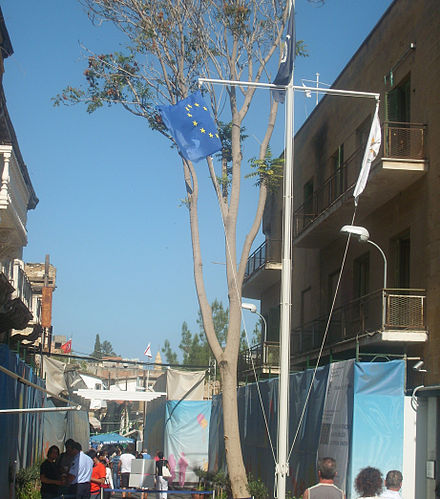 As Northern Cyprus is not an internationally recognized state, the rules for entry are a little confusing, but far more relaxed than they used to be, and entry is certainly not difficult.
As Northern Cyprus is not an internationally recognized state, the rules for entry are a little confusing, but far more relaxed than they used to be, and entry is certainly not difficult.
All visitors to Northern Cyprus will need to pass through TRNC immigration, which is fairly painless. A national ID card is sufficient for the citizens of Turkey, the EU, and the other countries within the Schengen Area. Practically all travellers except the Armenian, Nigerian, and Syrian nationals can get a visitor visa issued at the border or green line crossing point. Others will need to apply at "representative offices" (the TRNC has no embassies outside Turkey), such as in London (29, Bedford Square, London WC1B 3EG, UK. Tel: +44 20 7631 1920), Washington D.C. (1667 K. Street, Suite 690, Washington D.C. 20006, USA. Tel: +1 202 887 6198), New York (TRNC Office of the Representative, 821 United Nations Plaza, 6th Floor, New York, NY 10017, USA. Tel: +1 212 687 2350), and perhaps elsewhere.
When passing a Green Line checkpoint between the Republic of Cyprus and Northern Cyprus or entering via air or sea, TRNC immigration will stamp either a piece of paper (which seems to be the norm at the Green Line) or your passport (which seems to be the norm at air and seaports). You can usually get the officer to stamp the other document if you so wish. As TRNC stamps are no longer a problem for later visits to Greece or Cyprus, at least for EU citizens, you may choose whether to have that souvenir stamp in your passport or not.
Providing you have the right to enter Northern Cyprus, you will get a 90-day visa for most passport holders (EU, US, etc.) and less for other passport holders.
A one-day visa used to be granted when the north would not let in Greeks or Greek Cypriots or anyone with a Greek-sounding name and as a result the Republic of Cyprus would only allow day trips to the North for everyone else. The Greek Cypriots argued that you would be using stolen property if you stayed overnight in a hotel in the north. You could only cross at the Ledra Palace crossing, only on foot, only between 08:00 and 13:00, and you had to be back by 18:00. The day trip visa was issued at the TRNC checkpoint for the cost of one Cypriot pound. It hasn't been used for 10 years now.
Beware that if you are not a European citizen and you enter the island at the north, the officials in the south may deny you the entry, though there have been reports that this rule is not strictly implemented, especially for Canadian and U.S. citizens. Officially, entering the island at the north is illegal to the EU as a violation of EU immigration laws. However, for European citizens, entry to either side is no problem due to the freedom of movement.
By plane
As the state is not recognised by any international organisation, its Ercan Airport (dead link: August 2020) IATA: ECN is not recognised by the IATA. This means all flights (including charters) must touch down in Turkey before continuing to Ercan. Scheduled flights on Turkish Airlines and Pegasus connect via various destinations in Turkey, and to countries such as the UK, Germany and Iran.
It is also possible to fly to airports in the Republic of Cyprus (Larnaca is the closest) and take a taxi to the north, crossing the Green Line near Nicosia. It is best to have a travel operator arrange for a taxi from the north to collect you, since Greek Cypriot taxi drivers may not be willing to take tourists to the north. See details on crossing the Green Line below.
Alternatively - to avoid paying a "travel operator" - you can walk across the border at Ledra Street. There is a small tourist information kiosk on the left as soon as you cross.
By boat
Ferries operated by Akgunlerdenizcilik connect Kyrenia (Girne) to Alanya, Taşucu and Mersin in Turkey, and Famagusta (Mağusa) to Mersin.
The fast ferry from Alanya only runs in summer: from Alanya Th & Su at 12:00, from Kyrenia W & Sa at 10:00. This is a catamaran (shown in timetables as deniz otobüsü) for foot passengers taking about 2 hr 30 min.
A similar fast-cat ferry, summer only, takes 80 min from Mersin. It runs from Mersin Su Tu & Th at 21:00, from Kyrenia M W & F at 23:00.
The third fast-cat route, summer only, takes two hours from Taşucu. It runs Fridays only from Taşucu at 14:00 and from Girne at 10:00.
The only car ferry is from Taşucu and takes six hours. It runs four times a week in summer: from Taşucu on Su M Tu & Th at 23:30 and from Kyrenia M & Tu at 14:00, W & F at 23:30. This ferry runs all year.
The passenger-only ferries from the Hatay harbour of Madenli south of İskenderun are run by HADO, twice a week.
By car
You can enter Northern Cyprus with a rental car from the Republic of Cyprus at six of the eight border crossing points (see below). However, you will need to purchase car insurance for the North at the border (€20 for three days €35 for one month) because the insurance companies and police departments of the two sides do not co-operate. See details on crossing the Green Line below.
Since you need to have Northern Cypriot car insurance to drive in the north (car insurance from the Republic of Cyprus is not acceptable), it is important to know the working hours of insurance people at the border crossing points. Being the busiest crossing point, Agios Dometios/Kermia/Metehan crossing point in Nicosia offers the most extended hours. Here, the insurance people work 7 days a week from 08:00 to late at night usually till 00:00. At the rest of the crossing points, insurance people work from 08:00 to 17:00 7 days a week. On the other hand, immigration officers of the north and south work 24 hours a day all year long. So as long as you have Northern Cypriot car insurance and your passports (IDs are acceptable for EU countries, Schengen Area countries, Switzerland, Norway, Iceland, Liechtenstein and Turkey) with you, you can enter Northern Cyprus any time.
A few of the car rental companies from the Republic of Cyprus can refuse to hire a car if they know that it will be driven to the north. In one reported case in 2005 or 2006, a rental company refused to release a pre-booked car because the tourists had a hotel address in Northern Cyprus.
While driving in north, one should also be very careful about stationary speed cameras. The cameras work both ways on single lanes and work only one way on double lanes. There are 4 blue camera signs warning you before each camera and the signs are 100 metres apart. The fines range from €50 to €150 depending on excessive speed.
On foot
You can cross by foot at Ledra Street in the old town, and at the Ledra Palace crossing point to the west of the old town. Both crossings are for pedestrians only, so if you are travelling by car, you will need to use one of the other crossing points. See below for details on crossing the Green Line.
Going to and from the Republic of Cyprus
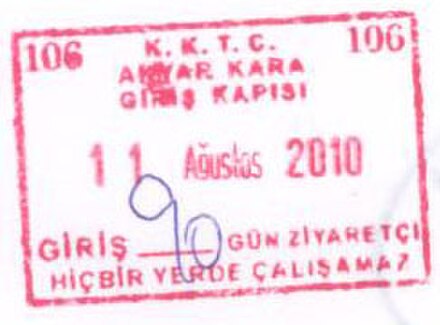 After the accession of the Republic of Cyprus to the European Union, the restrictions on travel to the north from the Republic have been lifted. From the EU's point of view, the entire island is a part of its territory and thus, there can be no restrictions on EU citizens (including Cypriots) travelling across the Green Line.
After the accession of the Republic of Cyprus to the European Union, the restrictions on travel to the north from the Republic have been lifted. From the EU's point of view, the entire island is a part of its territory and thus, there can be no restrictions on EU citizens (including Cypriots) travelling across the Green Line.
EU citizens may thus now cross the Green Line provided that they have entered Cyprus from a legal point of entry (airport or port declared open by the Republic of Cyprus). Other nationalities may be arrested and deported by Greek-Cypriot authorities if they entered the island via the north.
The main crossings between the south and north are:
- Astromerits/Zodhia (by car only) - the westernmost crossing near the town of Morphou/Güzelyurt
- Agios Dometios/Kermia/Metehan - major road and pedestrian crossing near Nicosia
- Ledra Palace (pedestrians only) - the oldest crossing, just outside the walls of old Nicosia to the west of the city
- Ledra Street (pedestrians only) - newest crossing opened on 3 April 2008 along Nicosia's old shopping street, making it the most central of all crossings.
- Pergamos/Beyarmudu
- Strovilia near Agios Nikolaos - located at the eastern part of the island near Famagusta
Get around
By bus or dolmuş/shared taxis
Public transport is in a pathetic state in Northern Cyprus. The main cities (Nicosia, Famagusta and Kyrenia) are connected by buses run by the İtimat company, but these services stop after 6PM. You can check the bus terminals of these cities for other buses, and there are usually buses that run once a day to and from rural areas (though these tend to bring commuters to Nicosia in the morning and leave at night). Bus services within cities are in a better condition, though these stop at late hours as well. Ercan Airport is rather well-connected to the main cities with buses.
"Dolmuş" or "kombos" are excellent options for budget travellers. These are shared taxis that stop for people who wave them down. The price of travelling between major cities and towns via dolmus (around 4-5 TL) are much lower than taxis, however, there are no schedules. Dolmus run often, and backpackers should be able to locate them in a few minutes. In city centers, there are usually plenty of dolmus options going to many cities, though late hours are still problematic.
By taxi
There are many taxi stations in Northern Cyprus, but you won't able to see many taxis around to wave them down, so make sure to get some numbers. There are taxi services in the Ledra Palace and Kermiya crossings, and at the Ercan Airport. Taxis are rather expensive though, with a journey from Nicosia to Kyrenia costing around 70-90 TL.
By car
 Renting a car is by far the most effective way to travel around Northern Cyprus. There are several rent-a-car services in Nicosia, Kyrenia and Famagusta. Only few car hire firms have offices at Ercan airport but almost all of them deliver cars to Ercan Airport. If you are arriving from the Republic of Cyprus via Larnaka/Nicosia and want to pre-book a car, it is possible to use the internet to find a northern rental company willing to have a car waiting for you at the Ledra Palace crossing point in Nicosia. Rental costs in Northern Cyprus are much higher than in the south but the quality of the cars is good. Note that rental cars are normally rented with an empty tank, so the first task is to find a petrol station. The second task is to calculate how much fuel you are likely to use, as no credit is given for unused fuel.
Renting a car is by far the most effective way to travel around Northern Cyprus. There are several rent-a-car services in Nicosia, Kyrenia and Famagusta. Only few car hire firms have offices at Ercan airport but almost all of them deliver cars to Ercan Airport. If you are arriving from the Republic of Cyprus via Larnaka/Nicosia and want to pre-book a car, it is possible to use the internet to find a northern rental company willing to have a car waiting for you at the Ledra Palace crossing point in Nicosia. Rental costs in Northern Cyprus are much higher than in the south but the quality of the cars is good. Note that rental cars are normally rented with an empty tank, so the first task is to find a petrol station. The second task is to calculate how much fuel you are likely to use, as no credit is given for unused fuel.
By thumb
Hitchhiking in Northern Cyrpus is extremely easy. Locals are friendly, roads are in good condition, and most drivers are traveling mid- or long-distance. Drivers do not ask for money, will go out of their way to ensure that you make it to your destination, and will pick you up at any time of day (or night).
See


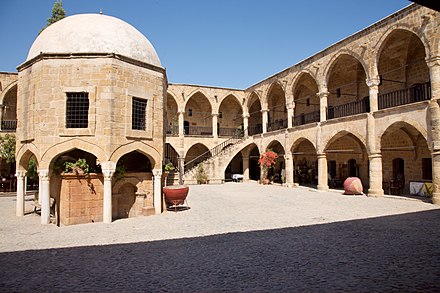

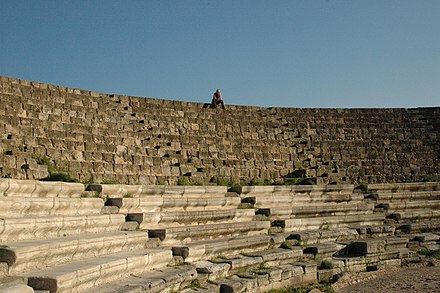 Northern Cyprus is home to many fascinating sights, below is just a selection:
Northern Cyprus is home to many fascinating sights, below is just a selection:
- Kyrenia Harbour and Castle - Kyrenia is often called the pearl of the Mediterranean, and for good reason. Under the scenery of the green Beşparmak Mountains, with its picturesque pier, many boats anchored on the harbour and full of bars and restaurants, continuing the adjacent Kordonboyu Street and the captivating sunsets, this is a complete must-see and the perfect place to take a promenade. It is impossible to see the castle overseeing the harbour, and the castle is well worth a visit with the beautiful views and the shipwreck museum.
- Castles - the Beşparmak Mountains are home to three picturesque and well-preserved castles, the St. Hilarion Castle, Buffavento Castle and Kantara Castle. St Hilarion is just above Kyrenia, and Kantara is closer to the Karpaz Peninsula. All of them offer breathtaking scenery of the coastline and the mountains, and also some refreshing clean air and hikes.
- Walled City of Nicosia - this is the destination of many tourists who cross the Ledra Street into the north, even though they miss much more of Northern Cyprus. Nicosia is home to perhaps the most well-preserved city walls that belong to a capital in the world, and they are shown on the municipal emblem as the symbol of the city. Be prepared to see a magnificent mosque, built in the Gothic style, the Selimiye Mosque (also known as Ayasofya or St Sophia Cathedral). Enjoy your meal and traditional crafts under the shade of the historical Great Inn (Büyük Han): a favourite for tourists. Wander around the streets to see the traditional architecture, especially in the Samanbahçe quarter, the 500-year-old and yet active Great Turkish Bath (Büyük Hamam), shop at the historical Bandabulya bazaar, greet the Venetian Column at the historical heart of the city (Atatürk Square) and beware of the historical buildings and museums popping out from every corner.
- Salamis ruins near Famagusta - this ancient Greek city is full of statues, agoras, and many more, including an amphitheatre where concerts and other events take place, and all of them right next to the see, with much of the complex still uncovered. This once-strategic great city is worth a visit.
- Walled City of Famagusta - Just like the walled city of Nicosia, historical buildings pop out everywhere in this walled city center. Another magnificent Gothic-style mosque, Lala Mustafa Pasha Mosque, once home to the crowning ceremonies of the Lusignan kings, the well-preserved city walls, the Othello Tower, where the Cypriot section of Shakespeare's play Othello takes place.
- Bellapais village near Kyrenia - known for its ancient monastery, which consists of picturesque ruins with great Gothic arches and towering stone walls, and a great view of Kyrenia. Cultural events such as classical music concerts take place throughout the year.
- Apostolos Andreas Monastery, Karpaz National Park and Cape Apostolos Andreas - located at the tip of the Karpaz Peninsula, farther north than Dipkarpaz, this well-preserved monastery is an ancient site of pilgrimage. Karpaz is unspoilt, and the only national park in Northern Cyprus known for its wild donkeys, who are so free they can block the roads. Near the Apostolos Andreas Monastery is the geographical end of Cyprus, Cape Apostolos Andreas, known as Cape Zafer (Zafer Burnu) locally. And do not miss the idyllic Golden Beach (Altın Kumsal), perhaps the most beautiful beach in all of Cyprus. (see the Beaches section below).
Do
Beaches




- Beaches are an important feature of Northern Cyprus, found throughout the coastline from the westernmost Yeşilırmak to the easternmost Dipkarpaz. There is a beach for everybody: for those who like to indulge in the luxury of seaside resorts to those who love the remote unspoilt golden stretches of sand. Below is a list of possible locations for beachgoers:
- The northern coast is swarming with golden beaches. Most of these beaches are vibrant, with many seaside hotels and clubs, which include,
- *Acapulco Hotel - in Çatalköy near Kyrenia. Big hotel built around a large cove, with a big pool and aquapark. Those who wish to stay overnight may check the hotel's website, otherwise, the fee for entrance is 25 TL (around US$13 as of August 2013) per person.
- *Escape Beach, also known as Yavuz Çıkarma Plajı (Yavuz Landing Beach, a reference to it being the first place the Turkish army landed in Cyprus in 1974) - is home to the Escape Beach Club and Club Locca, one of the important dance clubs in Northern Cyprus. (dead link: December 2020)
- *Cornaro Beach Club - associated with the nearby Malpas Hotel, the beach is home to a good fish restaurant (dead link: January 2023)
- *Kaplıca and Tatlısu - for those who like serenity but would like some luxury. Closer to the Karpaz Peninsula, these two villages (around 5 km from each other) host two hotels, restaurants and seaside facilities - Kaplıca, with a longer and cleaner beach, is home to caravans but Tatlısu is calmer with wooden bungalows. The hotels are much cheaper than the great hotels around Kyrenia and in Bafra, but still clean.
- Karpaz Peninsula is home to some very beautiful beaches, below are only two:
- *Golden Beach - dubbed as the most beautiful beach in the whole island, and one of the longest beaches in the island, this idyllic beach is located close to the tip of the peninsula, Dipkarpaz. The color of the water and the sea is unmatched and with all its remoteness, brings to mind the stereotypical Pacific beaches. However, there are no facilities, so be careful.
- *Bafra - this long beach is the subject of heavy investment, with many hotels such as Kaya Artemis Hotel (contains aquapark) and Noah's Ark Hotel being built, so this could be a destination for those looking for luxury. Part of the beach is operated by the municipality and is free of charge.
- The eastern coast, again containing big facilities such as Salamis Bay Conti Hotel
- *Varosha - a former seaside ghost town, declared reopened for tourism as of October 2020.
- *Palm Beach - this surely is an interesting beach. There were reports of pollution due to an oil spill in July 2013, but the locals continue to frequent it.
- *Glapsides Beach - a classical scene for Northern Cyprus, golden sands with good facilities
- The Dillirga region also contains some beaches, including Aspava Restaurant's beach. The sand and the facilities here are not as good as in the other areas, however.
The above list of beaches is not exhaustive, there are many more beaches with good facilities, and many more unspoilt ones which are up to the traveller to discover.
Casinos
Northern Cyprus has been dubbed as the Turkish Las Vegas. Casinos attract many visitors from Turkey and the Republic of Cyprus, where they are banned, and from foreign countries. Turkish Cypriot citizens are not allowed to enter the casinos, but the casinos are a bit relaxed about this.
You will find casinos everywhere in the country apart from the remote Morphou region. Every luxurious hotel has one, and there are a lot of those. Formal attire is expected at the casinos.
Do not get into quarrels in the casinos, even though they are very rare. The mafia is involved in them. You will find that many locals, especially the conservatives, are upset about casinos as they are a way of money laundering. Also, it is not advisable to gamble with a lot of money.
Nightlife
Kyrenia and Famagusta have a vibrant nightlife, with numerous dance clubs and concerts in the summer. Nicosia may be a disappointment for the seekers of such activities.
The places marked as "night clubs", especially just outside Nicosia on the Nicosia-Morphou highway, are prostitution centres. Even though prostitution is illegal in Northern Cyprus, the government turns a blind eye, so the risk of prosecution is almost non-existent. Many local men frequent these "night clubs".
Water sports
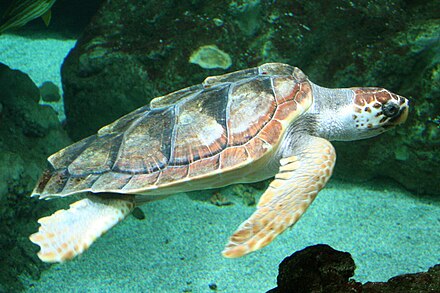 Scuba diving in Northern Cyprus is a spectacular experience. Scuba diving is not allowed individually, but a quick Google search will reveal the companies who organize dives and Kyrenia Harbor is a good place to find them. Shipwrecks, sea turtles, soft corals, colourful sponges, stingrays, octopuses, scorpion fish and countless others are there to be discovered. There are around 20 different sites for diving around Kyrenia.
Scuba diving in Northern Cyprus is a spectacular experience. Scuba diving is not allowed individually, but a quick Google search will reveal the companies who organize dives and Kyrenia Harbor is a good place to find them. Shipwrecks, sea turtles, soft corals, colourful sponges, stingrays, octopuses, scorpion fish and countless others are there to be discovered. There are around 20 different sites for diving around Kyrenia.
Water sports such as windsurfing, jetskiing, waterskiing and sailing are also available at beaches throughout the coastline. Sailing is especially found at Escape Beach Club, near Kyrenia.
Festivals
Concentrated in the summer season, numerous festivals take place throughout Northern Cyprus, organized by almost every municipality. Make sure to check the festival dates before going to Northern Cyprus. Concerts by local, Turkish and international bands and musicians, folk dance and modern dance shows and many other activities take place during these festivals. Alternatively, classical music lovers can visit the Bellapais Classical Music Festival in the historical atmosphere of the Bellapais Abbey.
Other activities
- Paragliding - seeing the beauty of Northern Cyprus from 750 m (2500 feet) and gliding down is an unforgettable experience and well worth it. You can find companies which organize this at the Kyrenia Harbor, especially Tandem Paragliding.
- Boat tours - there is no difficulty in finding boat or yacht tours to explore the northern coast from the Kyrenia Harbor during summer. Boat tours from the port of Famagusta to the Karpaz Peninsula are also available.
- Hiking and trekking - the Kyrenia mountains are the places to do this. There are many centers which organize this, one being the Mountain Climbing Sports Association, meeting as often as weekly.
- Golf - at the Korineum course
Buy
Money
The Turkish lira, denoted by the symbol "TL" (ISO code: TRY), is the official currency in North Cyprus. The lira is divided into 100 kuruş (abbreviated kr). Euros and UK pounds are widely accepted in the bigger cities. Credit cards are also accepted in larger shops, supermarkets, and the more upmarket restaurants. Scams at the exchange offices are unheard of.
Shopping
.jpg/440px-T%C3%BCrk_liras%C4%B1_(Specimen).jpg) Traditional items can be found at the Great Inn (Büyük Han) in Nicosia. Souvenir shops are in all major cities, especially at the Kyrenia Harbour and the Arasta region of the walled part of Nicosia. Lefkara lace, produced in the Lefkara village which remains in the southern side of the Cyprus, then carried on by the displaced Turkish Cypriots, is now a widespread item to buy. Sele and sesta are traditional items made of straw.
Traditional items can be found at the Great Inn (Büyük Han) in Nicosia. Souvenir shops are in all major cities, especially at the Kyrenia Harbour and the Arasta region of the walled part of Nicosia. Lefkara lace, produced in the Lefkara village which remains in the southern side of the Cyprus, then carried on by the displaced Turkish Cypriots, is now a widespread item to buy. Sele and sesta are traditional items made of straw.
There is one shopping mall in Famagusta, the Lemar AVM, with many international brands. International brands can also be found in the thriving and vibrant Dereboyu region in Nicosia, a 15-minute walk from the walled city.
Property
Northern Cyprus property is low cost in comparison to property in the Republic of Cyprus. However, potential buyers should be wary of title disputes, as title insurance is not generally available. Accordingly, it is very important to understand the various types of title deeds available in Northern Cyprus. See Northern Cyprus Title Deeds.
Also be sure and check thoroughly that the property (whether a house or land) intended for purchase in Northern Cyprus, was not (and still legally is according to international law) owned by a Greek Cypriot prior to the war in 1974 and abandoned as a result.
There is a risk, if the property was once owned by a Greek Cypriot, that the buyers could face legal action in the Republic of Cyprus and elsewhere in the EU, including the United Kingdom, where most foreign buyers come from. The buyer could likely be ordered by the (Greek) Cypriot, British or other EU member courts to pay legal fees to their legal Greek Cypriot owner. There has only ever been one case where this has in any way happened, however, known as the "Orams case" (dead link: December 2020), where no money was paid to the plaintiff. The "Demopoulos case" of 2010 led to the European Court of Human Rights recognising that the current owners of property in Northern Cyprus have rights over their land and ruling that the Immovable Property Commission of Northern Cyprus is the correct place for future disputes to be settled.
Eat


Some of the key foods featured in the Turkish-Cypriot cuisine, and some of whom do not exist in mainland Turkish and Greek cuisines, include Molehiya, Enginar Dolması, Kolokas, Bullez, Çiçek Dolması, Magarina-Bulli, Pilav, Bulgur Köftesi, Mucendra, Hummus Çorbası, Hellimli and Pirohu, etc.. Some special meals are explained below:
- Halloumi, known as hellim in Turkish (use the Turkish name as some Turkish Cypriots may be offended from the use of the Greek name due to trademark disputes), is an important feature of the Cypriot cuisine. The Turkish Cypriots use it in many meals, such as Hellimli (a sort of cake with hellim), Hellim Böreği (a sort of pastry) or Pirohu (the traditional Turkish meal of mantı with hellim instead of meat)
- Şeftali Kebabı, made from lamb, is a very delicious must-eat
- Fırın Kebabı or Kleftiko is a mouth-watering local kebab made from lamb and the Cypriot potato, also known for its taste
- Magarına Bulli, is pasta with chicken, and hellim sprinkled all over it. Ask especially for hand-made pasta (el magarınası) and yahnili magarına
Mezes include:
- Grilled hellim - if you come to Northern Cyprus and leave without trying this, your trip will be incomplete, as hellim is a rare sort of cheese that can be grilled without melting
- Çakısdez (pronounced chuck-ess-dez) - green olives, manually and onerously crushed using special stones, and added flavor using garlic
- Humus - mashed chickpeas, sesame paste, garlic, olive oil and lemon juice, this is an excellent side dish for kebabs
- Samarella - dried meat
And here are some local desserts. Turkish Cypriot cuisine offers a huge variety of desserts so this list is far from complete:
- Pekmez - the Beşparmak/Pentadaktylos mountains are swarming with carob trees and this thick syrup of carob juice tastes exceptionally good in Cyprus. At traditional restaurants, you will find mouth-watering desserts made of pekmez, such as gullurikya.
- Nor böreği - nor is another type of cheese special to Cyprus, and this pastry with nor, cinnamon and sugar is almost addictive
- Katmer - there are two types of this, sini gatmeri and sac gatmeri (pronounced sach, NOT sak). Sac gatmeri is an exceptionally delicious and light pastry made of sugar and dough.
- Ekmek Kadayıfı - soft, special sort of dough filled with the nor and sweet syrup - splendid with vanilla ice-cream!
- Macun - preserved fruits. Try especially ceviz macunu (walnut macun).
Traditional European restaurants exist too, from the basic fish and chips providers up to expensive haute cuisine. Indian curry houses have been opening and there are some good Chinese and Thai restaurants also. The fast-food chain Burger City, directly linked to Burger King, has restaurants in all district capitals apart from İskele. Turkish food, such as döner, adana kebap and tantuni is also widespread.
For those self-catering, food of many types and nationalities can be found in the many supermarkets. Even pork cuts can now be found from specialist retailers.
Drink

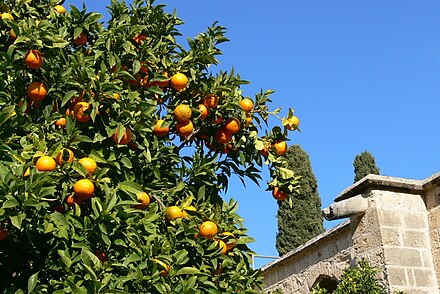
- Zivania - one of the most important local drinks, made from grape. Unlike the Republic of Cyprus, as Northern Cyprus is not bound by European regulations, there are zivania varieties with up to 95% alcohol by volume, so take care! There is a saying among Turkish Cypriots that goes like "the best of zivania is the one that burns well when you set it on fire". Do learn how much alcohol the zivania you're buying contains. Note that zivania is not easily found anywhere.
- Brandy - popular because of its taste, the Cypriot brandy is well worth a try. What is more spectacular, though, is the local cocktail, the Brandy Sour, a mixture of brandy and the lemon squash, made from the lemons of the Morphou region.
- Wine - Northern Cyprus is not an important wine producer, but there are two notable local brands: Aphrodite and Kantara. Even though the official travel guide describes it as "light, fruity and palatable", some travellers have reported that it is better to avoid it. It is still worth a try, though. Wines from the Turkish mainland are generally good and the average cost is about TL12 per bottle (2013). However imported wines from South Africa, Chile, Australia and Argentina are widely available and are fairly reliable and good value.
- Locally produced Rakı, which is the national drink of the Turks (similar to Ouzo which is the national drink of the Greeks, as they both have a strong aniseed flavor, but with different proportions) and all internationally imported varieties.
- Beer - The lager brand named Efes from Turkey is ubiquitous and well worth a try (and costs less than half of what it does in Turkey, due to the lower taxes in North Cyprus) as are some bland European brands such as Carling and Heineken. English ales and Guinness are rare but can sometimes be found.
As for non-alcoholic drinks,
- Ayran - the Turkish classic
- Orange juice - Northern Cyprus is famous for its great oranges, so why not try their juice?
Sleep
Accommodation in Northern Cyprus is plentiful. Rooms are typically of lower standard than in the rest of Cyprus and are correspondingly lower priced. The Northern Cyprus Hoteliers Association maintains a list of virtually all accommodation. In all parts of Cyprus, it is customary (and recommended) to make a thorough inspection of the room you are considering prior to checking in.
For individual accommodation listings, please see our relevant city destination article.
Learn
All universities in Northern Cyprus are private.
There are five Northern Cypriot universities holding over 40,000 students:
- Near East University (Yakın Doğu Üniversitesi)
- Eastern Mediterranean University (Doğu Akdeniz Üniversitesi)
- Cyprus International University (Uluslararası Kıbrıs Üniversitesi)
- European University of Lefke (Lefke Avrupa Üniversitesi)
- Girne American University (Girne Amerikan Üniversitesi)
There is also a campus of Middle East Technical University. Istanbul Technical University is also planning to open a campus in Northern Cyprus.[2]
Atatürk Teacher Academy and Police Academy provide vocational education in related subjects.
Work
Working is forbidden to anybody not in possession of a permit, which is not easily obtainable for visitors.
Cope
Electricity
The electricity is 240 volt and the UK-style of rectangular 3 pin plugs and sockets are used. Be warned that power cuts are fairly frequent and that the voltage fluctuates, which can damage anything connected.
Stay healthy
- There are many gymnasiums situated in the main cities such as Nicosia, Famagusta and Kyrenia.
- Only drink bottled water. Tap water is OK if boiled.
Stay safe
Northern Cyprus is a relatively safe place, as tourists do not have to worry much about crime. In Kyrenia, British retirees often speak of how safe they feel there, and that they can walk down dark streets at any time of night and feel safe. Crimes such as pickpocketing are unheard of, even in the bigger cities and lively areas, such as the Dereboyu quarter of Nicosia.
However, there are a few exceptions to this. The walled town of Nicosia, inhabited mostly by Turkish mainlanders, is known as an unsafe place among locals and most refrain from going there apart from the main streets at night. While during daytime it is as safe as anywhere in Northern Cyprus, be careful during the night, especially if going through dark streets, and exercise common sense. Catcalling for female travellers is sometimes encountered when the Turkish mainlanders are involved, though this by no means should cause limitations. Violent crime is very rare, and even though Kyrenia has the highest rate of violent crime in Northern Cyprus, it is still rare and it is safer than most cities in Europe and America.
Respect
Religion
Although 99% of Turkish Cypriots are Sunni Muslims, the vast majority of Turkish Cypriots are secular. Unlike mainland Turks and Greek Cypriots, Turkish Cypriots are not conservative and many do not practise any religion. For example, alcohol is frequently consumed by Turkish Cypriots and women dress casually (headscarves and veils are very rare and are limited to very few deeply religious women and some elderly women). Religion only plays a limited role within the community, for example, with the circumcision of Turkish Cypriot boys at a young age due to religious reasons, as well as with funerals, and occasionally religious weddings by an imam, which are symbolic, as only civil weddings are recognized by the strictly secular Turkish Cypriot state.
But however secular and liberal the Turkish Cypriots are on religion, it is extremely rude to insult or mock Islam. For example, do not mock or mimic the five times daily calls to prayer, as Turkish Cypriots would be deeply offended.
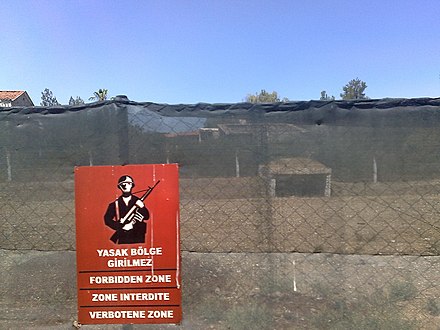
Politics
It is best to avoid discussion of the Greek-Turkish divide and the violent events beginning in 1963 to 1974, with the end result being the occupation of the northern and eastern 40% of the island by Turkey, as the vast majority of Turkish Cypriots are very nationalistic and sensitive on this issue.
Openly denigrating or insulting symbols of the state, especially the flag or Kemal Atatürk, is liable to cause deep offence and possibly result in charges.
Etiquette
One should also show respect in approaching people of the opposite sex or be mindful of any gestures which are regarded as very offensive, such as staring and addressing the locals in a loud voice (because it is regarded as condescending).
Gay and lesbian travelers
Homosexuality, long officially banned, was legalized in 2009, but same-sex relationships are not recognized by the government and open displays of same-sex affection are very likely to draw stares and whispers. Nevertheless Northern Cyprus is considered to be safe for gay and lesbian travellers, and violence against homosexuals is unheard of.
Connect
Telephone code
International calls are routed to Northern Cyprus via the Turkish area code 392. When dialing from Turkey, the usual domestic format of 0 + 392 + 7-digit local number is used. When calling from other countries +90 + 392 + 7-digit local number is used.
On the other hand, calls from the Republic of Cyprus can be made by dialing the 0 + 139 + 7-digit local number format which charges at local rates as well as the international +90 + 392 + 7-digit local number format which charges at international rates.
Mobile phones
The two local mobile phone networks will allow you to make and accept international and local calls on your mobile phones, however the connections are expensive. Far better to buy a local pay-as-you-go SIM-card from either TelSim (Vodafone) or Turkcell which offer the usual facilities at much cheaper rates. Be aware that mobile phones with SIM cards from the Republic of Cyprus will not work in Northern Cyprus as there is no agreement between the companies (CYTA and MTN) and the Turkish operators; there is only one operator from the Republic of Cyprus (Primetel) which allows you to roam in northern Cyprus by sending message to 8133 with the text T ON. At €1 per MB, this service will cost you dearly, so only use it as a stopgap until you can get local service. Similarly, your SIM card purchased for use in Northern Cyprus will not work south of the border. The most affordable all-island solution on the market is the 30-day Europe Roaming SIM from Three Hong Kong at HK$ 198 for 3.3 GB, but this SIM must be purchased before arrival and is hard to find online.
Internet connections
The better hotels all offer internet connections of some sort, and there are numerous internet cafes. However you connect though, the connection speed will be slow and the service erratic.